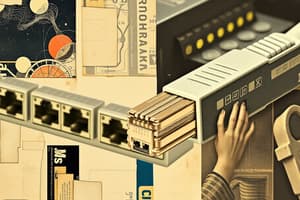Podcast
Questions and Answers
Which device connects cables without processing signals or regenerating them?
Which device connects cables without processing signals or regenerating them?
- Router
- Repeater
- Switch
- Hub (correct)
At which layer of the OSI model does a Switch operate?
At which layer of the OSI model does a Switch operate?
- Layer 1
- Layer 2 (correct)
- Layer 4
- Layer 3
What distinguishes Routers from Hubs and Switches in terms of functionality?
What distinguishes Routers from Hubs and Switches in terms of functionality?
- Routers do not maintain any address tables.
- Routers make routing decisions based on IP addresses. (correct)
- Routers provide physical connections.
- Routers only broadcast signals to all devices.
Which of these features is unique to Switches?
Which of these features is unique to Switches?
What type of addressing does a Router utilize for its operations?
What type of addressing does a Router utilize for its operations?
Which device is considered least intelligent in terms of communication processing?
Which device is considered least intelligent in terms of communication processing?
Which device uses a routing table to make decisions about data transmission paths?
Which device uses a routing table to make decisions about data transmission paths?
What is the primary function of a Hub in a network?
What is the primary function of a Hub in a network?
What is the primary role of a switch in a network?
What is the primary role of a switch in a network?
Which device is considered the most sophisticated in a network environment?
Which device is considered the most sophisticated in a network environment?
What is a key characteristic of a hub?
What is a key characteristic of a hub?
Which of the following statements is true regarding the maximum speed of network devices?
Which of the following statements is true regarding the maximum speed of network devices?
In what scenario is a router primarily used?
In what scenario is a router primarily used?
Which statement accurately compares hub and switch cost?
Which statement accurately compares hub and switch cost?
What component is crucial for a router's functionality?
What component is crucial for a router's functionality?
How does a switch differ from a hub in terms of message transmission?
How does a switch differ from a hub in terms of message transmission?
Flashcards
Hub function
Hub function
A simple network device that connects multiple wires/cables without any signal processing, just repeating the signal to every port except the originating one.
Switch function
Switch function
A network device that operates at the data link layer (Layer 2) using MAC addresses to forward data only to the intended recipient port.
Router function
Router function
A network device operating at the network layer (Layer 3) that determines the optimal path for data between networks using IP addresses.
OSI Model Layer 1
OSI Model Layer 1
The physical layer of the OSI model, dealing with the physical media and signals.
Signup and view all the flashcards
OSI Model Layer 2
OSI Model Layer 2
The data link layer of the OSI model where data is encapsulated and MAC addresses are used for communication within a network segment.
Signup and view all the flashcards
OSI Model Layer 3
OSI Model Layer 3
The network layer of the OSI model that deals with routing data between different networks via IP addresses.
Signup and view all the flashcards
MAC address
MAC address
A unique identifier assigned to a network interface card (NIC) that identifies a specific device on a network.
Signup and view all the flashcards
IP address
IP address
A unique address assigned to devices on an internet protocol network, used to identify devices on different networks.
Signup and view all the flashcards
Hub
Hub
A multiport repeater that transmits the signal received at any port to all other ports.
Signup and view all the flashcards
Switch
Switch
A telecommunication device that receives and transmits messages only to the intended destination.
Signup and view all the flashcards
Router
Router
A sophisticated device that forwards packets to the intended network by examining the IP address.
Signup and view all the flashcards
Hub speed
Hub speed
Typically 10Mbps to 100Mbps, depending on the type.
Signup and view all the flashcards
Switch speed
Switch speed
Up to 100Mpbs for some wired connections. Can be higher for more modern networks.
Signup and view all the flashcards
Router Cost
Router Cost
Relatively more expensive than Hubs and Switches.
Signup and view all the flashcards
Hub Use Case
Hub Use Case
Used in Local Area Networks (LANs).
Signup and view all the flashcards
Router Use Case
Router Use Case
Used in LANs, MANs, and WANs.
Signup and view all the flashcardsStudy Notes
Hubs, Switches, and Routers
- Hubs are simple network connectors, operating on the physical layer (Layer 1) of the OSI model.
- They broadcast signals to all connected devices.
- Hubs are less expensive than switches and routers.
- Original hubs had a speed of 10 Mbps; modern internet hubs are 100 Mbps.
- Hubs are used in Local Area Networks (LANs).
Switches
- Switches operate at the data link layer (Layer 2) of the OSI model.
- They use MAC addresses to transmit data only to the intended recipient.
- They are more sophisticated and expensive than hubs.
- Maximum speeds vary from 10Mbps to 100 Mbps.
- Switches are also used in LANs.
Routers
- Routers operate at the network layer (Layer 3) of the OSI model.
- They use IP addresses to determine the best path for data transmission.
- Routers are more sophisticated and more expensive than switches and hubs.
- They have greater speeds, from 1-10 Mbps wireless and up to 100 Mbps wired connections
- Routers are used in LANs, Metropolitan Area Networks (MANs), and Wide Area Networks (WANs).
Studying That Suits You
Use AI to generate personalized quizzes and flashcards to suit your learning preferences.




